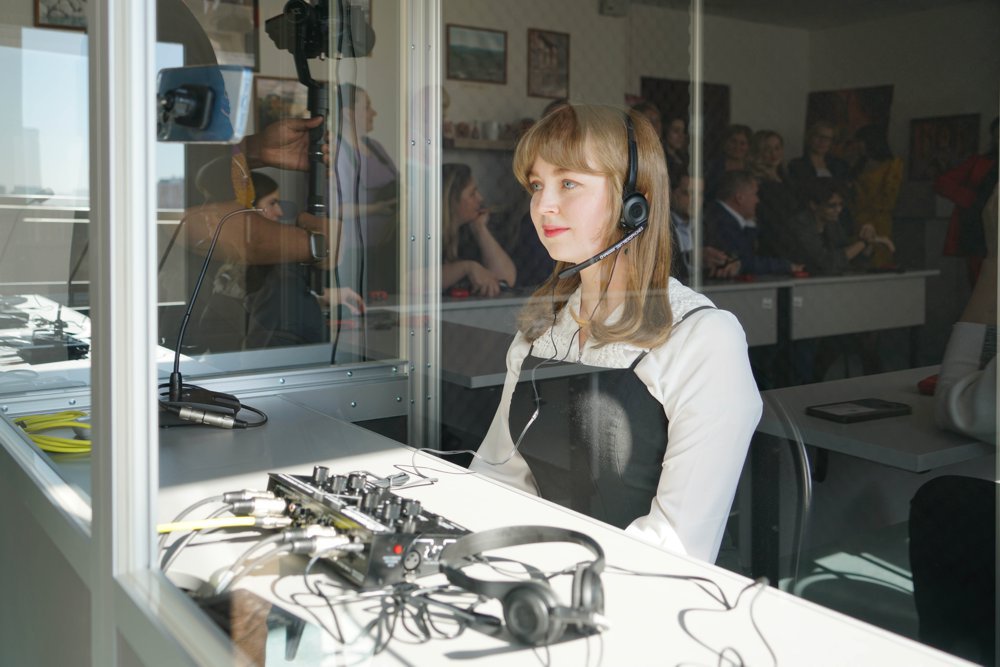Lyricists and physicists are now on equal terms: the first humanitarian laboratory opened in RUDN

“Many people's first association with a laboratory is 'physical', 'chemical' or 'medical'. But colleagues have opened a humanities research lab, where they will conduct neurolinguistic and cognitive research”, - Oleg Yastrebov, Rector of RUDN University.
There are several stereotypes about simultaneous interpreting: "the life of an interpreter is continuous tinnitus", "only men can translate", "only people with a certain mentality are accepted into simultaneous interpretation". The team of the Neurolinguistic and Cognitive Research Laboratory will debunk these myths.
“Last year we, the Faculty of Philology and the Research Institute for Brain Development and Peak Performance of RUDN won a megagrant and purchased equipment. This will allow us to carry out high-tech research in the field of language, neurolinguistics and cognitive research. And all of them will be interdisciplinary”, -Yulia Ebzeeva, First Vice Rector — Vice Rector for Education of RUDN University.
The staff will conduct research in neurolinguistics, neuropsychology, cognitive sciences, psycholinguistics, psychology, cognitive linguistics, neuromarketing, intercultural and mass communication, imagology, linguopragmatics, discourse analysis and other areas. The equipment of the laboratory will make it possible to determine the degree of expertise of specialists, the relationship between motor rhythm and type of nervous system.
For example, Emoradar can be used to analyze a video and recognize micro-mimicry and micro-movements of various facial muscles. Then interpret them to identify stressors and emotions that a person is experiencing.
An eye tracking device will allow you to evaluate eye movement while reading a text. This will help determine the degree of expertise of a professional, analyze how a person views videos, images, and works of art. The device captures and analyzes both conscious and unconscious movements. The whole brain is involved in these movements, so the system will be able to scan its structure and identify diseases, inclinations, features, strengths and weaknesses. For example, in schizophrenia, a person fixes attention not on objects, but on the background. From the point of view of neuromarketing, it will help to assess how users view the site page, where they are looking, what they are looking at.
An egoscope device will allow to conduct cognitive psychophysiological tests. They can be used to evaluate psychomotor and neurodynamic properties, such as coordination and endurance of the nervous system.
The goal of the laboratory is to integrate scientific work into the educational process. This will allow students not only to study more easily and successfully, but also to study with a minimum level of stress. The most promising research of the laboratory is the synergy of research bases of bilingualism and simultaneous translation. There is no such research base in the world. The results can be applied from marketing to linguistics. They will help determine the peculiarities of psyche, strengths and weaknesses of candidates when applying for a job.
The project to develop a cellular model of the placenta became the winner in the Scientific Materials category of the Young Scientists 3.0 competition, organized with the support of the Presidential Grants Foundation and T-Bank.
Ten scientific journals published by RUDN University have been included in the highest level of the state list of scientific publications, the White List.
Forests are not only the lungs of the planet, but also home to millions of species. However, it has remained unclear how underground interactions between trees and fungi affect forest species richness in different climatic conditions. Previous studies have yielded conflicting results: in some regions, the dominance of certain fungi reduced tree diversity, while in others it increased it.
The project to develop a cellular model of the placenta became the winner in the Scientific Materials category of the Young Scientists 3.0 competition, organized with the support of the Presidential Grants Foundation and T-Bank.
Ten scientific journals published by RUDN University have been included in the highest level of the state list of scientific publications, the White List.
Forests are not only the lungs of the planet, but also home to millions of species. However, it has remained unclear how underground interactions between trees and fungi affect forest species richness in different climatic conditions. Previous studies have yielded conflicting results: in some regions, the dominance of certain fungi reduced tree diversity, while in others it increased it.